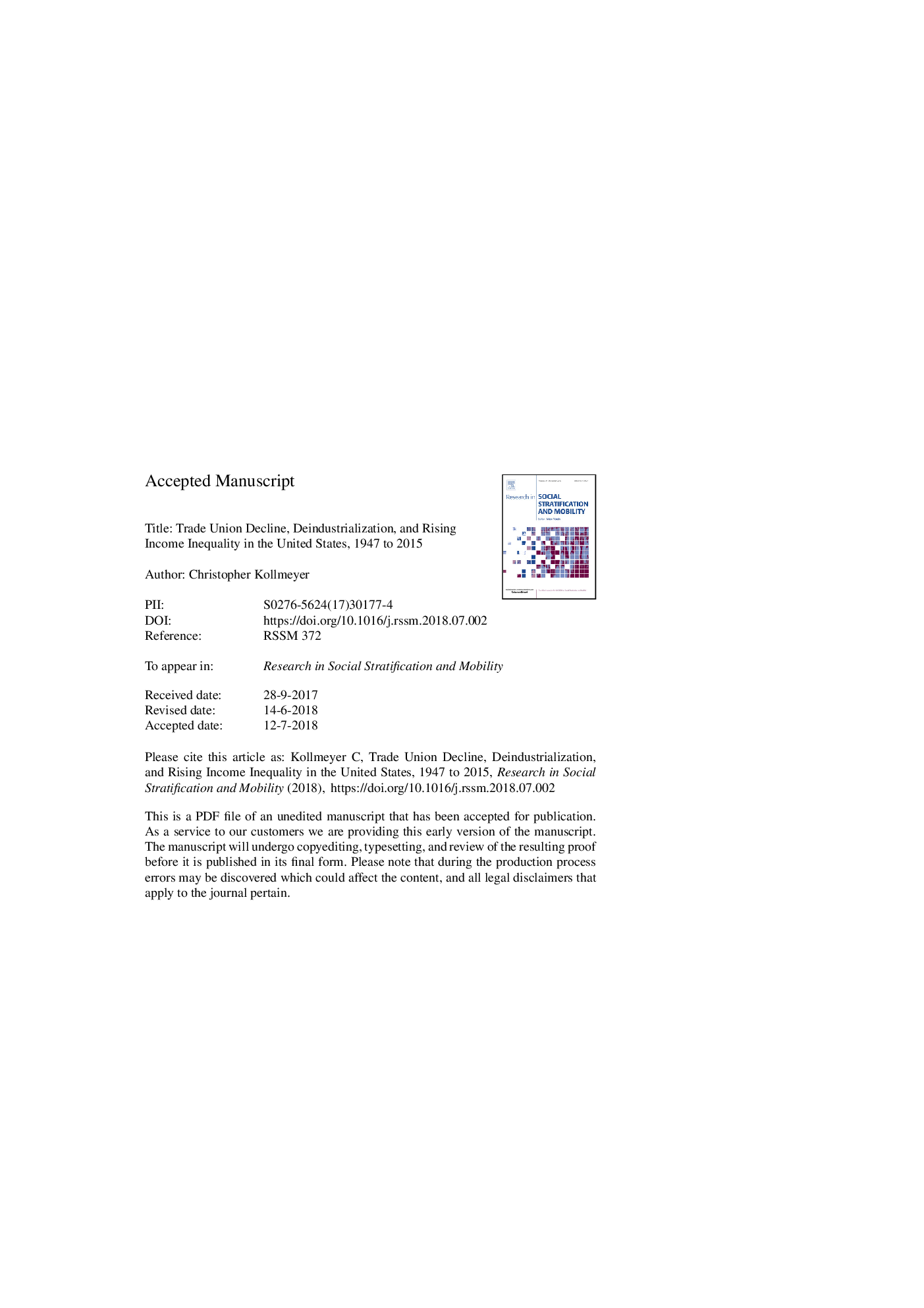| کد مقاله | کد نشریه | سال انتشار | مقاله انگلیسی | نسخه تمام متن |
|---|---|---|---|---|
| 7409792 | 1481555 | 2018 | 37 صفحه PDF | دانلود رایگان |
عنوان انگلیسی مقاله ISI
Trade union decline, deindustrialization, and rising income inequality in the United States, 1947 to 2015
ترجمه فارسی عنوان
کاهش اتحاد کارگری، کاهش تولید صنعتی و افزایش نابرابری درآمد در ایالات متحده، 1947 تا 2015
دانلود مقاله + سفارش ترجمه
دانلود مقاله ISI انگلیسی
رایگان برای ایرانیان
کلمات کلیدی
ترجمه چکیده
افزایش ناگهانی نابرابری درآمد در ایالات متحده با سقوط اتحادیه های کارگری و تغییرات ساختاری در اقتصاد منطبق است، اما مطالعات پیشین در نظر نمی گیرد که آیا این پدیده ها به نحوی که نابرابری را افزایش می دهند، تعامل می کنند. نویسنده بر این باور است که فروپاشی اتحادیه های کارگری که در زمینه توسعه صنعتی و توسعه کارهای روزمره تولید می شود، تأثیرات توزیعی عمیق تر را ایجاد می کند تا این عوامل در انزوا ایجاد شود. این استدلال با استفاده از مدل های رگرسیون سری زمانی و داده های ملی در سال های 1947 تا 2015 مورد آزمایش قرار گرفته است (از سایر عوامل مهم نابرابری درآمد). نتایج اثرات متقابل پیشنهادی را پشتیبانی می کند که نشان می دهد که درک کامل نابرابری و طبقه بندی اجتماعی باید در نظر نگیرد فقط موسسات و بازارها، اما چگونه آنها را تعامل می کنند. نتایج همچنین نشان می دهد که نابرابری توسط مالی سازی، کاهش بخش عمومی و بیکاری هدایت می شود، اما نه به واسطه تغییرات تکنولوژیک.
موضوعات مرتبط
علوم انسانی و اجتماعی
اقتصاد، اقتصادسنجی و امور مالی
اقتصاد، اقتصادسنجی و مالیه (عمومی)
چکیده انگلیسی
The steady rise of income inequality in the United States coincides with trade union decline and structural changes to the economy, but prior studies do not consider whether these phenomena interact in ways that magnify inequality. Drawing on institutional and market accounts of inequality, the author develops the argument that trade union decline, occurring within the context of deindustrialization and the offshoring of routinemanufacturing jobs, creates more profound distributional effects than these factors would create in isolation. This argument is tested (net of other important determinants of income inequality) using time-series regression models and national-level data from 1947 to 2015. Results support the proposed interaction effects, suggesting that a thorough understanding of inequality and social stratification must consider not only institutions and markets, but how they interact. The results also suggest that inequality is driven by financialization, public sector retrenchment, and unemployment, but not necessarily by technological change.
ناشر
Database: Elsevier - ScienceDirect (ساینس دایرکت)
Journal: Research in Social Stratification and Mobility - Volume 57, October 2018, Pages 1-10
Journal: Research in Social Stratification and Mobility - Volume 57, October 2018, Pages 1-10
نویسندگان
Christopher Kollmeyer,
